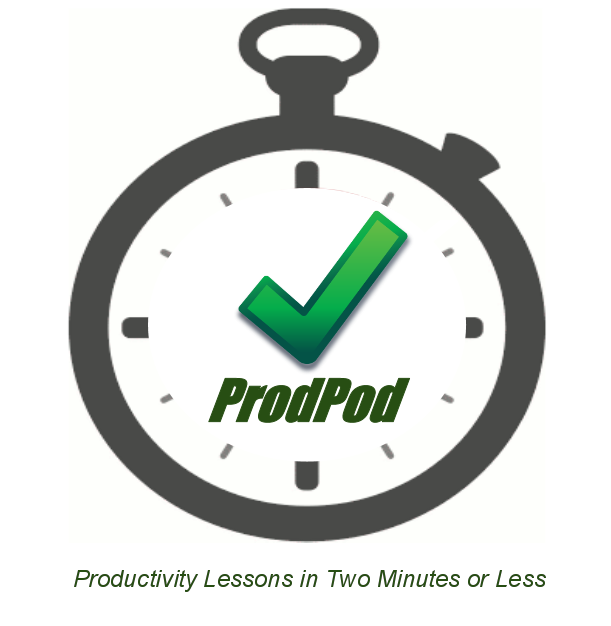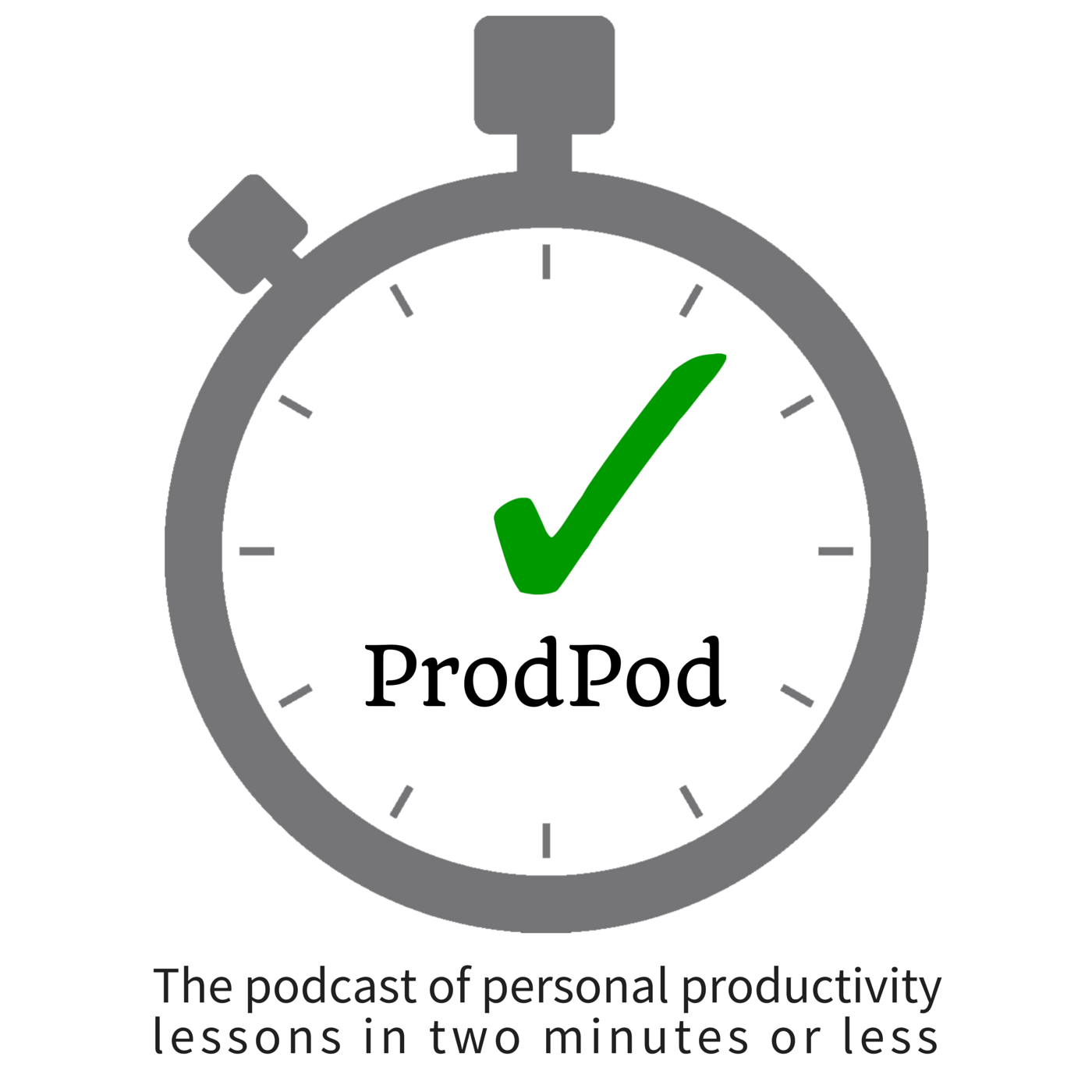Episodes

Tuesday May 01, 2012
Tuesday May 01, 2012
I had the pleasure of interviewing Paula Whitacre, principal, Full Circle Communications, which provides writing and editing services to help organizations reach wider audiences. She provided a great quick tip on writing productivity. Enjoy! Oh, and if you get a chance, please subscribe to Paula's e-newsletter, Ease in Writing. (I think that link will work; if it doesn't, visit her website and subscribe from the email field on the main page of the site.) Ease in Writing is clear, succinct and always helpful.

Tuesday Apr 24, 2012
ProdPod: Episode 35 -- Emotional Intelligence and a Productive Life
Tuesday Apr 24, 2012
Tuesday Apr 24, 2012
In 1996, Daniel Goleman wrote his hit book, Emotional Intelligence: Why It Can Matter More Than IQ. Mr. Goleman is a journalist, and not a scientist, but nevertheless he made a break-through in the way in which humans understand ourselves by giving context to the new ways scientists were learning about our psychology. Here's the book in a nutshell and how it relates to productivity. The premise of the book is quite simple: raw intelligence (IQ) tests score a human metric that doesn't correspond directly with success in life, and that emotional intelligence (or, EQ) is a psychosocial skill that should be taught so that humans are more productive members of society. Goleman heavily relies on studies to support his theory, and I think he does so quite successfully. The study that stood out for me the most when I read it fifteen years ago now, was a study that appears deep in the book in Part III, Chapter 10, "Managing with Heart." In this chapter, the author describes how researchers basically test high IQ people using emotional intelligence tests. They found that the high IQ individuals that were mostly average and below average on the EQ tests were also those that started many projects or tasks at a time and didn't complete them. Those that shined on the EQ tests were the ones that took pride in completing their projects or tasks. We know anecdotally that successful people in life are usually those that get things done not just get things going. I think this makes a real statement for all of us living in the Digital Age. Focus on finishing what you set out to accomplish and don't get distracted and fragmented in your goals. You'll not only have greater emotional intelligence but you'll also see more success in your productive life.

Tuesday Apr 17, 2012
Tuesday Apr 17, 2012
Partly because I'm a tech geek and partly because of my professional responsibilities, I get to see a dizzying array of new technologies every day. And, I try to keep most of them swimming around in my head to differentiate the potential winners and likely losers in the market. FastCustomer is a productivity tool that I believe is one of those potential winners. According to its website, it is trying to "make customer service better for both companies and consumers." I think the concept (as I'll explain momentarily) is amazing and I hope it continues to be adopted by the broader consumer market and corporate customer service departments. Here's the problem it solves, how it works and what it means for your personal productivity. As you know, trying to get customer service on the line can sometimes be a major headache. FastCustomer steps in as a free Web, mobile SMS and smartphone app technology that waits for you, then connects you to customer service so you don't have any wait time. You can access the service via FastCustomer.com, install their Firefox or Chrome Web browser extensions, text 936-CALL-PLS, or use their Apple iOS or Android-based smartphone applications. You let them know what company you need a customer service call from and they do the rest for you. Once a representative is brought on the line, FastCustomer calls you and puts the representative on the phone. Poof! Think of the hours you'll save waiting from on hold! A few important details:
- the service is available in the United States and Canada presently and not all businesses' phone systems support FastCustomer;
- there's a human element to FastCustomer, meaning that the customer service rep needs to listen to FastCustomer's directions when they get on the line so that they don't disconnect your call before you pick up the line; and,
- if a company is not listed, you can request them to get listed but that doesn't mean they have to listen.

Tuesday Apr 10, 2012
Tuesday Apr 10, 2012
Welcome to Episode 33 of ProdPod, the podcast of productivity lessons in two minutes or less. I'm Ray Sidney-Smith, your productivity guide.
I'm rather comfortable with conflict resolution, but I see an abundance of poor conflict handling in the media today (especially coming from our politicians), I thought it might help to give an explanation of two foundational principles, Think Win-Win and Principled Negotiation, that have served me well in my business and personal life. If you've ever read Stephen Covey's The 7 Habits of Highly Effective People, you probably remember Habit #4, Think Win-Win. If you're not familiar, Dr. Covey basically espouses that you should strive for three win's in any long-term solution or agreement: mine, yours and ours. Therefore, if any of those three parties should lose, it's "no deal." The reasoning is that it's a loss for everyone in an interdependent group when one person loses. It was several years later while studying Conflict Resolution and Mediation that I learned about the book, Getting to Yes: Negotiating Agreement Without Giving In, [great summary here] by Fisher, Ury and Patton (a book that was born out of the Harvard Negotiation Project). This seminal work primarily focuses on teaching us Principled Negotiation, which is to:
- "separate people from the problems" (so that you can be compassionate with people, remove ego from the scenario as best as you can, and clearly see your other party's perspective);
- "focus on interests, not positions" (which brings the parties to discussing what they want and not their superficial stance when conflict arises);
- "mutual gains" (as the source of Covey's Habit #4 encouraging brainstorming and viewing the issues broadly); and
- "insist on using objective criteria" (by using fair standards decided upon upfront).

Wednesday Apr 04, 2012
ProdPod: Episode 32 -- Meditation's Power on Productivity
Wednesday Apr 04, 2012
Wednesday Apr 04, 2012
Welcome to Episode 32 of ProdPod, the podcast of productivity lessons in two minutes or less. I'm Ray Sidney-Smith, your productivity guide.
What do MRIs, Buddhist monks and meditation have to do with each other? It turns out, your productivity. There are many studies past and ongoing [here's a recent article of one such study] that reveal that meditation has innumerable benefits for helping the mind focus, which is one of the key ways in which we can take advantage of our productive hours of the day. However you express yourself secularly or spiritually, calling it meditation, prayer, quiet time, introspection or otherwise, as long as you focus your attention calmly and steadily, you can gain the mental benefits. By the act of teaching your brain to focus, the rest of the collateral benefits in your productive life follow naturally. I've meditated for many years and here's a quick exercise that I still practice to this day when I find it difficult to let go of my day ahead, or the day's events. With eyes closed, sit in a relaxed, quiet space. You may need ear plugs. And, you should turn your electronic devices off and put them somewhere outside of the room. Start at a small number, say, 20. Breathe deeply through your nose into your stomach (otherwise known as "diaphragmatic breathing" or "yogic breathing"), hold for a moment, and then slowly exhale to the count of three. As you do this, keep your hands rested supine on your legs to combat restlessness and raise your chest slightly as you inhale on occasion to fix your posture. Count silently, "Twenty." Take another deep breath into your diaphragm and repeat as you count down to one. Increase the number of your breaths as you find more time to meditate or reduce the number and tuck several sessions throughout the day. There are many meditative practices, so while this exercise may not fit you forever, use it while you find one that does. Your productivity will be glad you did.

